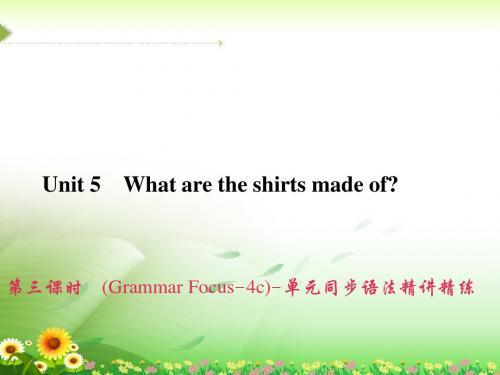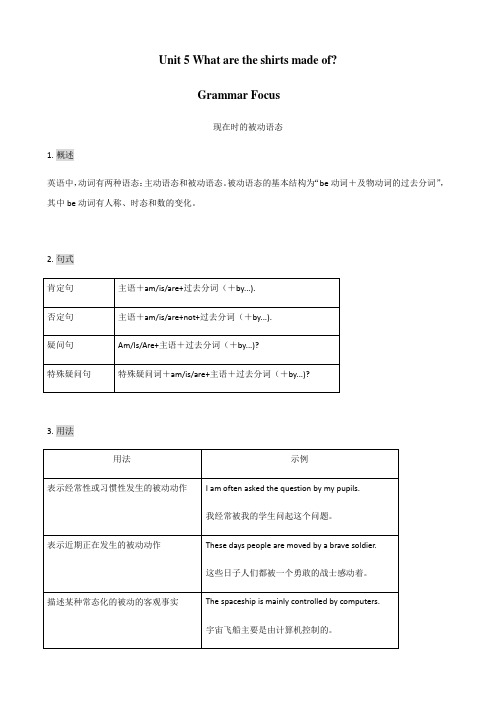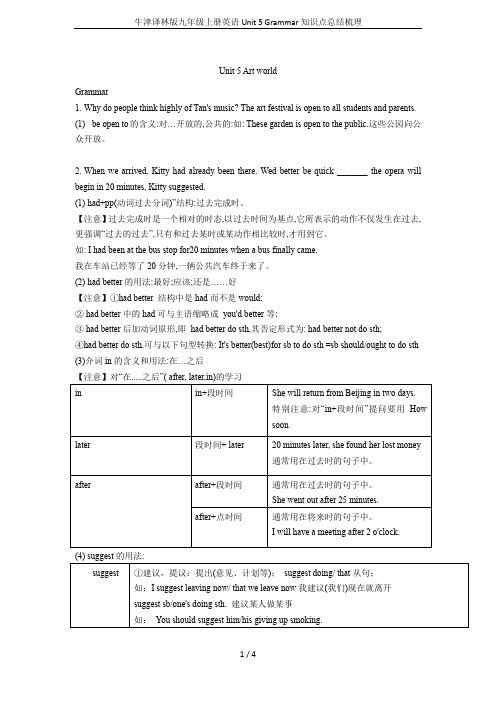九年级英语上册第五单元知识点讲解Grammar
- 格式:docx
- 大小:31.04 KB
- 文档页数:7


人教版九年级上册第五单元语法知识点梳理Unit 5:What are the shirts made of?第五单元的语法重点是:一般现在式的被动语态;现在完成时;名词所有格。
一般现在式的被动语态:英语中有两种语态:主动语态和被动语态。
主动语态表示主语是动作的执行者。
被动语态表示主语是动作的承受者。
★一般现在时的被动语态表示现阶段经常性、习惯性的被动动作,由“主语+am/is/are+及物动词的过去分词(+by+动作执行者)”构成。
例如:The yard is cleaned(by someone)every morning.院子每天早上都有人打扫。
★当我们不知道谁是动作的执行者,或不用指出动作的执行者,而需要强调动作的承受者时,就要用被动语态。
例如:Mobile phones are mainly used to keep in touch with other people.手机主要被用来和其他人保持联系。
★一般现在时的被动语态的一般疑问句是将be提至句首;否定句是在be后加not。
例如:Is Chinese spoken by many people?许多人说汉语吗?The little girl is not looked after by her mother.这个小女孩不是由她的妈妈照顾。
★主动句变被动句将主动句的宾语变为被动句的主语,将主动句的谓语变为被动结构(be+过去分词),将主动句的主语放在介词by之后作宾语,若为主格应改为宾格。
例如:He broke the cup.他打破了杯子。
→The cup was broken by him.杯子被他打破了。
【中考真题】:1.Han Han's books are popular.They______by many teenagers.A.is readB.was readC.are readD.were read2..-At present,one of the best ways to study is working in groups.-More chances______to students to learn from each other.A.offerB.are offeredC.have offeredD.are offering现在完成时:★由have/has+过去分词★表示过去发生或已经完成的某一动作对现在造成的影响或结果,常与already,just,yet,ever,never连用。

Unit 5 What are the shirts made of?Grammar Focus现在时的被动语态1.概述英语中,动词有两种语态:主动语态和被动语态。
被动语态的基本结构为“be动词+及物动词的过去分词”,其中be动词有人称、时态和数的变化。
2.句式用法3.4.主动语态变为被动语态的方法第一步:将主动语态的宾语改为被动语态的主语;第二步:将主动语态的谓语改为“be+及物动词的过去分词”结构;第三步:将主动语态的主语改为介词by的宾语,放在谓语之后(有时可省略)。
主动语态:They(主语)grow(谓语)tea plants(宾语)in the south-east of China.被动语态:Tea plants(主语)are grown(谓语)by them in the south-east of China.【扩展】主动语态中,在make、hear、see、watch和notice等词后跟省略to的动词不定式做宾语补足语,但在被动语态中,to不可省略。
☑ McDull often makes his classmates laugh.麦兜经常让他的同学们大笑。
☑ His classmates are often made to laugh by McDull.同学们经常被麦兜逗笑。
1.I wash dishes every day.(改为被动语态)__________________________ every day.2.Most of the farm work is done by machines in China today.(改为一般疑问句) ____________________________________________ in China today?3.The jacket is made of cotton.(改为否定句)The jacket _______________________________ cotton.4.French and English are spoken in Canada.(对画线部分提问)___________________________________in Canada.5.He takes good care of the child.(改为被动语态)_____________________________________________.【答案速查】1.Dishes are washed by me2. Is most of the farm work done by machines3. isn't made of4. What languages are spoken5. The child is taken good care of by him。



Unit 5 Art worldGrammar1.Why do people think highly of Tan's music? The art festival is open to all students and parents.(1)be open to的含义:对…开放的,公共的:如: These garden is open to the public.这些公园向公众开放。
2.When we arrived, Kitty had already been there. Wed better be quick _______ the opera will begin in 20 minutes, Kitty suggested.(1)had+pp(动词过去分词)”结构:过去完成时。
【注意】过去完成时是一个相对的时态,以过去时间为基点,它所表示的动作不仅发生在过去,更强调“过去的过去”,只有和过去某时或某动作相比较时,才用到它。
如: I had been at the bus stop for20 minutes when a bus finally came.我在车站已经等了20分钟,一辆公共汽车终于来了。
(2)had better的用法:最好;应该;还是……好【注意】①had better 结构中是had而不是would;② had better中的had可与主语缩略成you'd better等;③ had better后加动词原形,即had better do sth,其否定形式为: had better not do sth;④had better do sth.可与以下句型转换: It's better(best)for sb to do sth =sb should/ought to do sth(3)介词in的含义和用法:在…之后练习:(1)Did Alan enjoy seeing his old friends yesterday?Yes, he did. He _______ his old friends for a long time.A.didn’t seeB. wouldn’t seeC. hasn’t seenD. hadn’t seen(2) By the time my parents reached home yesterday, I _______ the dinner already.A had cookedB cookedC have cooked D. cook(3) ________ the end of last month we had seen more than ten American movies.A. ByB. AtC. InD. From(4) The manager is said to have arrived back from Paris where he _________ some European business partners.A. would meetB. is meetingC. meetsD. had met(5) The wind ________ for a week before you came here.A blewB blowsC has blown D. had blown(6)The teachers _________the office for a few minutes when we arrived, We didn't meet them.A. had leftB. have been away from C had been away from D. have left(7)Oh, I had a terrible toothache.You’d better ________ see a dentist and have your bad teeth pulled out.A to goB goingC goes to D. go to(8) She will wake up in two minutes.(就画线部分提问)_______ ________ will she wake up?(9)-What time do you expect me back, Mum?Say,_______ half an hour.A.atB. beforeC. inD. for(10)The plane will take off ________ three hours. I must get to the airport right now.A. inB. forC. onD. at(11) I hear our teacher will be back _________three weeks' time.A. atB. inC. forD. after(12)When will the second class begin?________ two minutes.A.ForB. AtC. InD. After(13)Shanghai Disneyland has started to be built and it will be open _______ five years.A. inB. forC. fromD. before(14)我的朋友建议我在银行找个工作。
3. —What kind of music do you _____________?—I prefer pop music.—你最喜欢哪种音乐?—我更喜欢流行音乐。
4. Because he was the King of Pop. His __________ was amazing.因为他是流行音乐之王。
他的音乐天赋太棒了。
Reading【核心单词】1. ____________vt. 颁发;提交2. ____________n. 乐器;工具;器械3. ____________adj. 普通的,一般的,常见的4. ____________n. 物品,东西5. ____________n. 石头6. ___________vt. 控制,支配7. ____________n. 钟,铃8. ___________conj. 虽然,尽管【单词变形】1. present—__________(过去分词)2. centre—___________(形容词)3. music—___________(名词)4. win—__________(动词的ing形式)__________(名词)5. successful—___________(副词)6. tradition—___________(形容词)7. west—___________(形容词)8. boundary—____________(复数)【核心短语】1. ____________音乐无国界2. ____________被颁发给某人3. ____________一个世界闻名的作曲家4. ____________在湖南中部5. ____________对某事有兴趣6. ____________乐器7. ____________继续做某事8. ____________用普通东西创作音乐9. ____________慢慢了解10. ___________因……而闻名11. ___________通过控制……的速度12. ___________水流13. ___________一个古老的中国编钟14. ___________混合到一起15. ___________用一种西方的风格16. ___________形成一个新的类型17. ___________最伟大的作曲家之一18. ___________在他的作品中19. ___________为……作曲【核心句型】1. He loves ___________ and the blowing wind because, to him, the best music _____________.他喜欢流水的声音和风的吹拂,因为对他来说,最好的音乐来自大自然。
九年级英语上册第五单元知识点讲解Art worldGrammar重点单词’1 highly adv.高度地;高地highly作副词,意为“高度地;高地”,常用来修饰形容词或副词。
e.g. She is a highly educated woman.她是个受过高等教育的女人。
拓展highly 作副词时还可表示“非常,极”,其同义词为very;它还可表示“(对某人、某事物)非常赞许地,极为称赞地”,此时它常用于think/speak highly of sb.结构,表示“对某人极为赞赏;对某人评价很高”。
e.g. Her father is a highly successful politician.他爸爸是一位非常成功的政治家。
People all think/speak highly of Mike.人们对迈克的评价都很高。
2 last vi. 持续last作不及物动词,意为“持续”,常与介词for连用,“last for +时间”表示“持续多长时间”。
e.g. How long does the show last?那场演出要持续多久?The hot weather lasted for the whole month of June.炎热的天气在六月份持续了整整一个月。
拓展(1) last的其他用法作限定词最近的;上一个的最后的;最末的e.g.Did you see the game last night?你昨晚看了比赛没有?He was the last one to leave.他是最后一个离开的。
作副词最近;上一次最后;最终e.g. When did you see him last?你最近何时见过他?Who is speaking last? 谁最后一个发言?作名词最后来的人(或发生的事)e.g. They were the last to arrive. 他们是最后到达的人。
(2) lately也为副词,意为“最后一点;最后”,常用来引出所列事情中的最后一项或最后一点,其同义词为finally。
e.g. Lastly,I would like to thank my parents for all their support最后,我想感谢父母对我的全力支持。
重点短语,1 be able to do sth.能够做某事e.g. Ann was worried whether she'd be able to get there on time.安担心她是否能够按时赶到那里。
2 be open to sb.对某人开放e.g. School playgrounds will be open Io the public.学校的操场将对公众开放。
3 out of breath.上气不接下气e.g. I was out of breath after running for the bus.因为追赶公共汽车,我上气不接下气。
4 get bored感到厌烦e.g. After a while 1 got bored and left. 过了一会儿,我感到厌烦,然后就离开了。
要点详解1 Why is Tan able to build a bridge between the East and the West?为什么谭盾能够在东西方之间搭建起一座桥梁?解析able是形容词,意为“能,能够”。
be able to do sth.意为“能够做某事”。
e.g. I was able to skate when I was seven years old.七岁时,我就会滑冰了。
辨析be able to与canbe able to强调在某具体事件中的能力,表示“经过努力而成功地做成某事”,适用于各种时态,且可以和情态动词连用,还可以构成动词不定式。
e.g. Luckily we were able to use the new machine.幸运的是,我们会使用这台新机器。
You must be able to speak French for this job. 干这项工作你得会说法语。
can强调一般性的能力,表示“有能力做某事”,没有人称的变化,且只有现在时和过去时(could)两种形式,没有将来时和完成时。
e.g. I can't help you with your Maths.我不能帮你学数学。
He could read and write when he was five.他五岁时就能读书写字。
2 After a while ,we saw Amy running towards us.过了一会儿,我们看见埃米向我们跑来。
解析作动词,意为“看见”,强调看的结果,其过去式和过去分词分别为saw 和seen。
e.g. I looked at the blackboard carefully but I saw nothing.我仔细看了看黑板但什么都没看见。
He was seen running away from the scene of the crime.有人看见他从犯罪现场跑开。
辨析see sb. doing sth.与see sb. do sth.see sb. doing sth.意为“看见某人正在做某事”,强调看见某动作正在进行。
e.g.I saw you playing soccer when I came to school.当我到校时,我看见你正在踢足球。
(强调动作正在进行)see sb. do sth.意为“看见某人做了某事”,强调看见某动作发生的全过程或经常性的动作。
e.g. I saw you put the key in your pocket. 我看见你把钥匙放进了口袋。
( 强调动作发生的全过程)I often see him play ping-pong.我经常看见他打乒乓球。
(强调经常性的动作)拓展see sb. do sth.结构中的do sth.是省略了to的不定式短语,但在被动语态中,省略的to要还原回去。
与see有类似用法的动词还有watch,hear,notice 等。
e.g. I often see him ask questions after class. = He is often seen to ask questions after class by me.我经常看到他在课后问问题。
3 “I'm late because there was too much traffic ,”she said ,out of breath."我迟到了,因为交通太拥堵了。
”她上气不接下气地说。
解析but of breath意为“上气不接下气”。
其中,breath是名词,意为“呼吸的空气”。
e.g. He was out of breath after only five minutes' walk.走了五分钟后他便上气不接下气了。
We had to stop for breath before we got to the top.我们不得不停下来喘口气,然后再登山顶。
拓展与breath相关的短语short of breath气短fight for breath大口地喘气take a deep breath 深深地吸一口气hold one's breath屏住呼吸catch one's breath缓一口气save one's breath别浪费口舌语法纵横because ,since和as引导的原因状语从句在复合句中,表示主句动作发生原因的从句叫做原因状语从句,常见的用来引导原因状语从句的从属连词有because ,since和as。
1. because引导的原因状语从句because意为“因为”,其引导的原因状语从句一般放在主句之后,用来表示造成某种情况的直接原因,语气最强,常用来回答由why引导的特殊疑问句。
需要注意的是,汉语中习惯说“因为……所...... ,但英语中不能将because与so 一起使用。
e.g. I do it because I like it.我做这件事是因为我喜欢。
——Why didn't you come to my birthday party? 你为什么没来参加我的生日聚会?——Because I was too busy.因为我太忙了。
I watched the movie because I was interested in it. = I was interested in the movie so I watched it.因为感兴趣,所以我看了这部电影。
2. since引导的原因状语从句since意为“既然;由于;因为" ,其引导的原因状语从句一般放在主句之前,用来表示显而易见的理由,较为正式,语气比because弱。
e.g. Since you are free today ,you can go shopping with me.既然今天你有空,你可以跟我去购物。
注意:now (that)也可以表示“既然;由于”,它与since 的意思相近。
Now ( that) you are grown up ,you should not rely on your parents.既然你长大了,你就不应该依靠你的父母了。
3. as引导的原因状语从句as引导原因状语从句时,表示附带说明的双方已知的原因,较为正式,语气比since弱,其在句中的位置较为灵活(常放在主句之前)。
e.g. As you are tired ,you had better have a rest.既然你累了,你最好休息一下。
I went to bed early,as I was exhausted.我睡得早,因为我筋疲力尽了。
课后实践运用高效练习场I单项选择。
( )1.1 saw a wallet on the ground on my way home.A. lieB. layC. lainD. lying( )2. In the future ,we_ fly to the Mars.A. will canB. will be able toC. were going toD. could be able to( )3. Each game an hour.A. lastB. lasts forC. lastingD. lasts to( )4. Mo Yan's books have been sold out in many bookstores his winning of the Nobel Literature Prize.A. becauseB. sinceC. asD. because of语法专练II.用because .since或as填空。